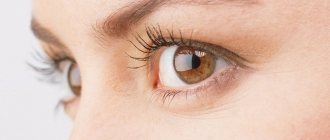Types of temperament and their characteristics
Properties of temperament
To divide temperament into 4 types, several properties of this concept were identified:
- Emotional excitability. Displays the minimum level of stimulus, the impact of which will cause an emotional response.
- Activity and inactivity. Activity reflects the amount of internal energy resources that a person uses to achieve a goal. Inactivity indicates how immune a person is to stimuli, such as insults.
- Plasticity and rigidity. Both concepts reflect how much a person is able to adapt to changing external conditions.
- Extraversion and introversion. Extroverts depend on manifestations of the external world, and introverts depend on the internal characteristics of their own psyche.
- Rate of reactions. Displays the speed of response to a stimulus, rate of speech, motor skills, as well as the speed of perception of information.
Eysenck's test questionnaire allows you to determine the severity of each of the properties, due to which the result is formed. In addition, the technique also takes into account such a criterion as the reliability of the answers, which allows you to avoid mistakes if a person is lying.
Types of temperament
Characteristics of the main types of temperament:
- Choleric. It is characterized by increased excitability and reduced rates of inhibitory reactions. He is active, prone to frequent mood swings, quick-tempered, and sometimes aggressive. The movements, facial expressions and speech of a choleric person are impetuous and fast. Control over emotions and feelings is reduced.
- Melancholic. He also has reduced control over his emotional background. A melancholic person is very susceptible to irritants and is sensitive. Such people are closed, afraid of change, and constantly worry. Emotions are mostly negative.
- Sanguine. It is considered the most balanced type of temperament in terms of reactivity and inhibitory reactions. It is characterized by a rapid change of impressions, interests, plans, and activities. He is highly active in those areas that interest him. Sanguine people are responsive and cheerful, they are characterized by some frivolity.
- Phlegmatic person. The main distinguishing quality of a phlegmatic person is calmness. It is very difficult to unbalance him, but at the same time his adaptive capabilities are very low. He switches from one state to another for a long time, so his emotional background is usually constant.
The manifestation of each type of temperament can traditionally be illustrated by the following image, which alternately depicts: choleric, phlegmatic, melancholic and sanguine:
G. Eysenck's test to determine the type of temperament.
G. Eysenck's test to determine the type of temperament.
Possible answers to the questions: “yes”, “no”. The first answer that comes to your mind is correct. Record your answers - “yes” - plus, “no” - minus - on a piece of paper.
- Do you often crave new experiences in order to experience strong sensations?
- Do you often feel that you need friends who can understand you, encourage you, and express sympathy?
- Do you consider yourself a carefree person?
- Is it true that it is very difficult for you to answer “no”?
- Do you think about your affairs slowly and prefer to wait before acting?
- Do you always keep your promises, even if it is not profitable for you?
- Do you often have ups and downs in your mood?
- Do you usually act and speak quickly, and do you spend a lot of time thinking?
- Have you ever had the feeling that you are unhappy, although there was no real reason for this?
- Is it true that you can decide on anything in a dispute?
- Do you feel embarrassed when you want to meet someone of the opposite sex who you like?
- Does it happen that when you get angry, you lose your temper?
- Do you often act under the influence of a momentary mood?
- Do you often worry about thoughts that you shouldn't do or say something?
- Do you prefer reading books to meeting people?
- Are you easily offended?
- Do you often like to be in company?
- Do you sometimes have thoughts that you would like to hide from other people?
- Is it true that sometimes you are so full of energy that everything in your hands burns, and sometimes you feel very lethargic?
- Do you prefer to have fewer friends, but especially close ones?
- Do you often dream?
- When people shout at you, do you respond in kind?
- Do you often feel guilty?
- Are all your habits good and desirable?
- Are you able to give free rein to your own feelings and have fun in a noisy company?
- Do you consider yourself an excitable and sensitive person?
- Are you considered a lively and cheerful person?
- After something is done, do you often return to it in your mind and think that you could have done it better?
- Are you usually quiet and reserved when you're around people?
- Do you sometimes gossip?
- Does it ever happen that you can’t sleep because different thoughts are popping into your head?
- Is it true that it is more pleasant and easier for you to read about what interests you in a book, although you can quickly and easily learn about it from friends?
- Do you have palpitations?
- Do you like work that requires constant attention?
- Does it ever happen that you “shiver”?
- Is it true that you always say only good things about people you know, even when you are sure that they will not know about it?
- Is it true that you don’t like being in a company where they constantly make fun of each other?
- Are you irritable?
- Do you like work that requires quick action?
- Is it true that you are often haunted by thoughts about various troubles and “horrors” that could happen, although everything ended well?
- Do you walk slowly and deliberately?
- Have you ever been late for a date, work or school?
- Do you often have nightmares?
- Is it true that you are such a lover of conversation that you never miss an opportunity to talk with a stranger?
- Do you have any pain?
- Would you be upset if you couldn't see your friends for a long time?
- Would you call yourself a nervous person?
- Are there people you know that you clearly don’t like?
- Can you say that you are a confident person?
- Are you easily offended by criticism of your shortcomings or your work?
- Is it difficult to truly enjoy a party?
- Does the feeling that you are somehow worse than others bother you?
- Would you be able to bring some life into a boring company?
- Does it happen that you talk about things that you don’t understand at all?
- Are you worried about your health?
- Do you like to make fun of others?
- Do you suffer from insomnia?
Test processing (“key”).
If the “key” answer matches your answer, you add one point to yourself. If it does not match, zero points.
Lie scale.
Answer “yes” to questions: 6, 24, 36.
The answer is “no” to questions: 12, 18, 30, 42, 48, 54.
Count the amount. If the result is 4 or more points, this means that you have developed the so-called social desirability: you answered not as you really are, but as you would like or as is accepted in society. In other words, your answers are not reliable. If the result is less than 4 points, your answers are sincere. Please continue.
If the “key” answer matches your answer, you add one point to yourself. If it does not match, zero points.
Extraversion scale.
The answer is “yes” to questions: 1, 3, 8, 10, 13, 17, 22, 25, 27, 37, 39, 44, 46, 49, 53, 56.
The answer is “no” to questions: 5, 15, 20, 29, 32, 34, 41, 51.
Count the amount.
Emotional Stability Scale.
Answer “yes” to questions: 2, 4, 7, 9, 11, 14, 16, 19, 21, 23, 26, 28, 31, 33, 35, 38, 40, 43, 45, 47, 50, 52 , 55, 57.
Count the amount
Draw coordinate axes: the horizontal axis is the “extraversion scale”, the vertical axis is the “emotional stability scale”. Each scale from 1 to 24 intersects at point 12. Mark your indicators on the axes. Find the intersection point. A point can lie on an axis if one of the scales is 12.
The result you got is your predominant temperament type. Using the extraversion scale, you can see the type of personality orientation: extrovert or introvert.
You can also present the same data in this form: • Melancholic
(unstable, introverted): easily upset, anxious, rigid, reasoning, pessimistic, reserved, unsociable, quiet.
• Choleric
(unstable, extroverted): active, sensitive, restless, aggressive, excitable, changeable, fickle, impulsive, optimistic.
• Phlegmatic
(stable, introverted): passive, prudent, reasonable, friendly, peace-loving, managerial, trustworthy, reliable, even, calm.
• Sanguine person
(stable, extroverted): sociable, sociable, talkative, responsive, laid-back, cheerful, carefree, proactive.
Based on statistical data, during the interpretation of test answers, subjects must make some systematic corrections to the results obtained after summing up the answers on each of the scales
.
These adjustments reflect the internal tendency of all people to consider themselves more stable and less prone to extreme manifestations of extraversion and introversion. To correct these tendencies, responses are often shifted by one, maximum two points from and the same distance up the “neuroticism-stability” scale. Research shows that pronounced introverts
(melancholic and phlegmatic) are more cautious in actions and judgments, pedantic, precise and careful when performing any work and, as a result, people with these types of character are better adapted to monotonous work.
At the same time, stable introverts
(phlegmatic people) cope better with the responsibility that takes place, for example, when working as a dispatcher or operator.
Pronounced extroverts
(choleric and sanguine) tend to be good organizers of production, businessmen, and have preferences in areas of activity related to decision-making, contacts with other people, for example, in the areas of advertising, press relations, etc.
In the course of determining and analyzing the type of one’s own character, a person naturally has the question of how stable his character is and how susceptible his traits are to change.
Firstly, it should be said that
the procedure for determining the type of character
(or, in other terminology, the type of temperament) has to some extent
probabilistic properties
.
This means that the results of testing a person to a certain extent depend on the external situation and on the internal state of the person. Of course, statistically, on average, each person will remain within his or her character type. However, the results of several tests may not fall on the same point. This means that, in principle, a person is capable, at least temporarily and not by much, of changing the parameters of his character, as if moving along a plane. In practical life, this is partly reflected in expressions like “today I was in shape,” “I’m on a lucky streak,” or “today was a good day.” Another important point is that character parameters are in principle controllable
.
Management can be carried out both from the outside (this is one of the functions of education) and from the inside, i.e. a person, to a certain extent, can directly change his character traits. In this case, the active principle is associated with the volitional qualities of the individual. The role of education in the processes of character formation, apparently, should be understood quite broadly. This is not only a directed influence of one personality, the personality of a teacher, on another person, but also a non-directed influence of the educational environment on a person’s personality. As an illustration, purely speculatively, as part of a mental experiment, one can imagine how different the influence of the environment will be on two children with the same type of character, but different appearance. It is clear that a more benevolent attitude of the environment (children, parents, other people), in principle, other things being equal, helps to reveal and develop positive character traits. Naturally, one should take into account the danger of spoiling the child, making him annoyingly selfish and proud. Correction of such a danger, as is known, is associated with directed education. Vladimir Mikhailovich Krol, Doctor of Biological Sciences, Professor at Moscow State Medical University named after. A.I. Evdokimova, professor at MSTU MIREA
History of the test
Eysenck's research in terms of temperament types dates back to the first half of the 20th century. The first questionnaire he compiled appeared in 1947 and was aimed at identifying neuroticism. The questionnaire was compiled by borrowing statements from other tests. You either had to agree with the statements or not.
After this, a second test questionnaire appeared in 1956. It already examined two traits: neuroticism and extraversion/introversion. It also added points to determine the level of sincerity of the subject. The next questionnaire consisted of a larger number of questions, but did not differ in assessment criteria, and only in the last version of the test did another criterion appear - psychoticism, which reveals signs of inadequacy.
Often, during a routine examination using the Eysenck test, they resort to the third form of the questionnaire without assessing psychoticism. To identify temperament, extraversion, neuroticism and the level of sincerity are sufficient.
EPI Test: General Information
As you know, Hippocrates, who described 4 types of temperament, took as the basis for his classification how bodily fluids affect a person: blood, lymph and bile. The approach of Hans Eysenck, also known as the creator of the IQ test, meets modern ideas about temperament types.
According to his theory,
temperament is determined by two main indicators - extraversion/introversion and neuroticism
.
As for the first indicator, it is unlikely to raise questions. This scale will tell you whether you are an introvert or an extrovert. In turn, neuroticism
– a scale reflecting emotional stability or instability, reaction to external stimuli and/or stress. A person with a high level of neuroticism is characterized by strong emotional reactions, emotional instability, mood swings, irritability, impulsiveness, etc.
The EPI test appeared in 1963, and a few years later Hans Eysenck, together with Sibylle Eysenck, created the EPQ (Eysenck Personality Questionnaire), also known as PEN (Psychoticism, Extraversion, and Neuroticism)
. As the name suggests, in addition to the two indicators described above, psychoticism was added to them. You can also take this questionnaire on our website.
This is interesting
Interesting fact! The studies that formed the basis of the future test were conducted on neurotic soldiers.
Extraversion
- Typical extrovert. Open and sociable, he feels the need to be in society, where he is highly active. Positive emotions predominate, control of feelings is reduced.
- Typical introvert. A closed person with little contact with people who prefers the inner world to the outside world. He loves introspection, which is why he is serious when making decisions, prefers not to take risks. The emotional background is directed towards the negative, but it is very difficult to anger an introvert.
Neuroticism
- Sustainability. Characterized by the ability to adapt to various changes, to achieve one’s goal without reacting to surrounding stimuli. Such a person rarely worries or fears the future. Characterized by reduced emotionality.
- Lability. Poor level of adaptation to change, as well as constant worry and fear. Expressed in rapid mood swings and poor control of feelings. It is easy to lead such a person astray from the intended path.
Test procedure and results
The questionnaire consists of 57 statements, with each of which you can agree, disagree, or skip. Certain blocks of questions are aimed at assessing one criterion, but in order to assess sincerity and exclude intentional answers, all groups are mixed together. For each answer, points are awarded: “Yes” - 2 points, “No” - 0 points and “Don’t know” - 1 point. After this, based on knowledge of which statement characterizes which feature, scores are calculated for each criterion, that is, for extraversion, neuroticism and sincerity.
The test results are interpreted using a coordinate system, where the vertical axis is neuroticism and the horizontal axis is extraversion. The system looks like this:
In this way, a certain type of temperament is determined. However, Sukhodolsky proposed some clarification for this test, which is illustrated in the following system:
In the interpretation of the results according to Sukhodolsky, the type of temperament is determined more accurately, since the system contains borderline states.
The most commonly used results scale is developed by Eysenck, based on which the results should be perceived as follows:
- Choleric – strong, active, unbalanced;
- Sanguine – strong, active, balanced;
- Phlegmatic – strong, inactive (inert), balanced;
- Melancholic – weak, inactive, unbalanced.
A complete description of each of the temperament types discussed above will allow you to understand your personality type in more detail. It should be remembered that the test shows only dominant traits, and there are no “pure” choleric people, phlegmatic people, etc. among people.
Test. Melancholic or phlegmatic? Find out what your temperament is
News / Tests
10.10.2020, 11:29 / remove_red_eye
122912 /
chat_bubble
14
For World Mental Health Day, which is celebrated annually on October 10, Intex-press, together with a psychologist, has developed an interesting test for you, thanks to which you can easily find out what type of temperament is inherent in you. You can share your results on social networks.
Photo: yandex.ru
For assistance in compiling the test, Intex-press would like to thank Mikhail Golos, a master’s student in the Department of Psychology at Baranovichi State University.
Imagine that your boss is yelling at you. Your actions:
You are walking down the street, and there are yellow fallen leaves under your feet. You:
Choose a Winnie the Pooh character close to you:
Imagine that you are meeting a person of the opposite sex. Which scenario is most suitable for you?
Which of the following professions do you prefer?
Select a shape:
Select element:
What genre of cinema do you prefer:
Choose a great person:
How do you rate the test you passed?
Test. Melancholic or phlegmatic? Find out what your Sanguine temperament is
You are a lively, cheerful, strong and balanced person. You are usually in a good mood, inquisitive, active, and able to control your emotions. You come across as a determined, optimistic, self-confident person. Easily get along with people, adapt to new surroundings, and in difficult situations do not lose your sense of humor, remaining collected and businesslike. But you often don’t finish the job you start if you get bored with it. Uninteresting work makes you bored, and you try to get rid of it as quickly as possible.
Phlegmatic person
You are a slow, diligent and outwardly calm person. You are consistent and thorough in your studies, you do not like running around and making noise, but you love to eat and sleep; you are not picky about food. You cannot be called a dreamer and an inventor. It is phlegmatic people who are able to carefully and conscientiously tear off pieces of wallpaper in the living room for hours without interfering with adults going about their business. But you can also cause a scandal if they give you the wrong cup or spoon. You strive to create an orderly system for organizing your entire life and relationships with people around you and the world. Strive to respect traditions. The strategy and taciturnity of a phlegmatic person often lead to success. But hesitation and long thoughts where a quick and clear reaction is needed often reduce your achievements to zero.
Choleric
You are quick-tempered, self-confident and impetuous. You make decisions instantly, so your ideas are often not well thought out, but very interesting. You are very mobile, cannot stand long waits, and are subject to sudden mood swings. A choleric child is a terrible fidget and arguer. He is decisive, persistent and fearless, he can change his decision at the last minute exactly the opposite, he loves risk and adventure. A kind of Mr. Fix - you don’t know what to expect from him in the next minute, and he himself doesn’t know it due to his impulsiveness.
Melancholic
Melancholic people especially need the support and approval of loved ones. You are very sensitive, touchy, wary of everything new. You are not confident in yourself, it is difficult for you to make a choice on your own. Melancholic people get lost in unfamiliar surroundings and are completely unable to stand up for themselves. The slightest trouble can throw them off balance. All of the above does not mean that melancholic people are unfortunate losers. Many of them are strong in literature, art, and professions that require a lot of attention and spiritual subtlety. The inner world of a melancholic person is incredibly rich; he is characterized by depth and stability of feelings. In childhood, a melancholic person behaves like a “little adult” - he is very reasonable, likes to find an explanation for everything, loves solitude. A melancholic person gives the impression of being a closed person: usually among his loved ones he chooses one with whom he is completely frank; soft and kind, shares his experiences with him. For others it leaves the phrase: “Everything is fine with me.” Disclosure of his secrets can be a great trauma and will make him withdraw even more into himself. People close to this type have a quiet speech, in conversation they adapt to the interlocutor, strive to evoke the sympathy of others. Melancholic people make high demands on themselves and others and tolerate loneliness quite easily.
Author: Alexandra RAZINA
Go to comments
Read intex-press.by
Google News
Yandex News
Yandex Zen
Most popular
- 07/07/2021 What is happening in Baranavichy exchange offices on July 7
- 07/04/2021 Minus 52 kg. How a girl from Baranovichi lost “half of herself” in a year without physical activity or grueling diets
- 07/06/2021 Test. How many points would you score on the Geography Test? Test yourself
- 07/04/2021 Test. How many points would you score on the CT on the history of Belarus? Test yourself
Topics: BarGUcharacteraggressionVoicepsychologycalmangertemperamentMisha Voice










